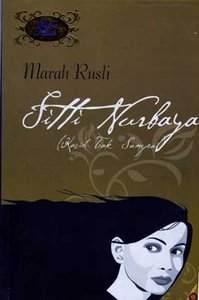Sitti Nurbaya

Cover of the 44th printing
|
|
| Author | Marah Rusli |
|---|---|
| Original title | Sitti Nurbaya: Kasih Tak Sampai |
| Country | Indonesia |
| Language | Indonesian |
| Genre | Novel |
| Publisher | Balai Pustaka |
|
Publication date
|
1922 |
| Media type | Print (hardback & paperback) |
| Pages | 291 (45th printing) |
| ISBN | (45th printing) |
| OCLC | 436312085 |
Sitti Nurbaya: Kasih Tak Sampai (Sitti Nurbaya: Unrealized Love, often abbreviated Sitti Nurbaya or Siti Nurbaya; original spelling Sitti Noerbaja) is an Indonesian novel by Marah Rusli. It was published by Balai Pustaka, the state-owned publisher and literary bureau of the Dutch East Indies, in 1922. The author was influenced by the cultures of the west Sumatran Minangkabau and the Dutch colonials, who had controlled Indonesia in various forms since the 17th century. Another influence may have been a negative experience within the author's family; after he had chosen a Sundanese woman to be his wife, Rusli's family brought him back to Padang and forced him to marry a Minangkabau woman chosen for him.
Sitti Nurbaya tells the story of two teenage lovers, Samsulbahri and Sitti Nurbaya, who wish to be together but are separated after Samsulbahri is forced to go to Batavia. Not long afterwards, Nurbaya unhappily offers herself to marry the abusive and rich Datuk Meringgih as a way for her father to escape debt; she is later killed by Meringgih. It ends with Samsulbahri, then a member of the Dutch colonial army, killing Datuk Meringgih during an uprising and then dying from his wounds.
Written in formal Malay and including traditional Minangkabau storytelling techniques such as pantuns, Sitti Nurbaya touches on the themes of colonialism, forced marriage, and modernity. Well-received upon publication, Sitti Nurbaya continues to be taught in Indonesian high schools. It has been compared to Romeo and Juliet and the Butterfly Lovers.
Sitti Nurbaya was written by Marah Rusli, a Dutch-educated Minangkabau from a noble background with a degree in veterinary science. His Dutch education led him to become Europeanized. He abandoned some Minangkabau traditions, but not his view of the subordinate role of women in society. According to Bakri Siregar, an Indonesian socialist literary critic, Rusli's Europeanisation affected how he described Dutch culture in Sitti Nurbaya, as well a scene where the two protagonists kiss.A. Teeuw, a Dutch critic of Indonesian literature and lecturer at the University of Indonesia, notes that the use of pantuns (a Malay poetic form) shows that Rusli was heavily influenced by Minangkabau oral literary tradition, while the extended dialogues show influence from the tradition of musyawarah (in-depth discussions by a community to reach an agreement).
...
Wikipedia
